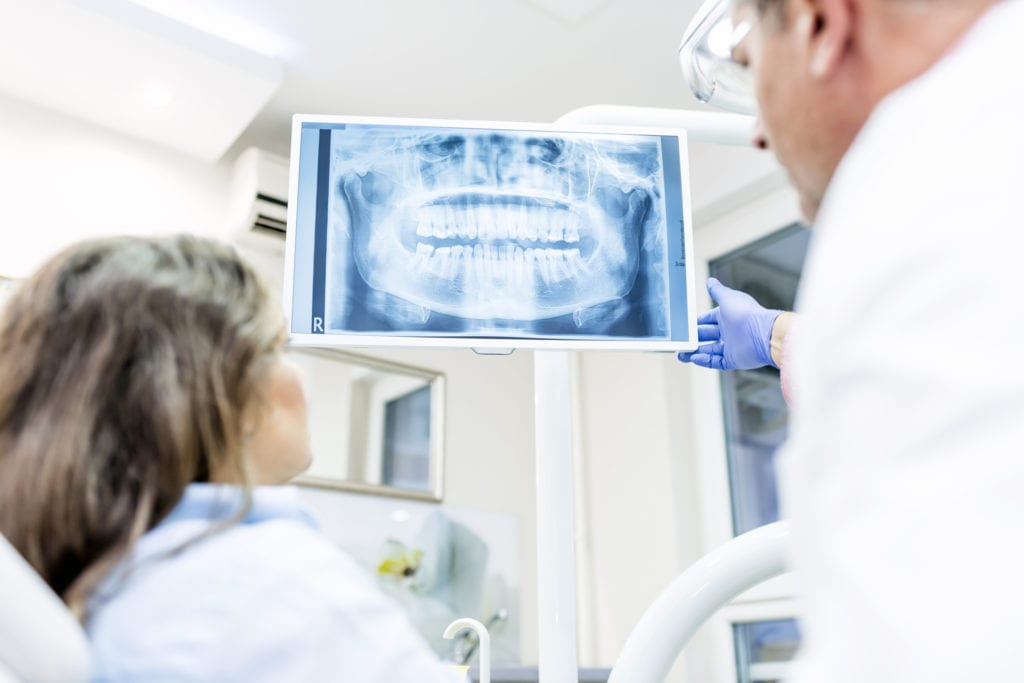Patients who suffer from bone loss in their jaw are unable to pursue teeth replacement options. Bone loss occurs overtime after you lose a tooth. The mouth needs the roots to maintain the structure and strength of the bone. Without them, the bone will slowly deteriorate in the area of the missing teeth.
Edentulous patients or patients who lack all their natural teeth will suffer greatly from jaw bone loss. Eventually, the reduction in bone density will result in facial sagging because of a lack of support. Additionally, deep wrinkles will form, and the chin will appear to stick out further than it should. These side effects of bone loss can make a person appear much older than they are.
If you have significant bone loss in your jaw, Premier Dentistry can help you restore the strength of your jawbone. Additionally, we also specialize in restorative dentistry and implant dentistry. Once we rebuild your jawbone, we can provide you with tooth replacement options to fully restore your oral health.

Bone Grafting in Chicago, IL
Dr. Nechama Brand and Dr. Abraham Stein specialize in prosthodontics. Prosthodontics refers to procedures involved in reconstructing and replacing missing natural teeth. While restorative dentistry refers to everyday dental procedures, prosthodontics are for more complex procedures. This includes full mouth reconstruction for a patient who is missing several or all their natural teeth.
To help patients with more extreme cases of tooth loss, our doctors provide bone and soft tissue grafting services. These services will to prepare your mouth for a full-mouth reconstruction. The procedures will also strengthen your jawbone and prepare it to support a restorative option like dental implants.
Our bone grafting procedure is straightforward. We take a piece of bone from another part of your jaw or body and transplant it into your jawbone. Then we will wait several months to allow for proper healing. During this time, the bone fragment will fuse to the jaw bone.
A prosthodontist provides bone grafting when a patient lacks enough remaining jawbone height or width to support a denture. In some cases, a bone graft to replace missing bone can give a more natural contour to the mouth. This process can allow for a more comfortable denture fit and increased longevity.
A patient may also need bone grafting if they have a traumatic jaw bone fracture, or to relieve pressure on an adjacent tooth. Other reasons for a bone graft may include:
- To replace missing or damaged jawbone tissue.
- To correct jaw defects caused by disease or trauma.
- To create space for dental implants.
- To improve alignment of the teeth and jaw.
- To improve chewing and speaking abilities.
- To restore the person’s facial proportions.
- To enhance an individual’s facial aesthetics.
- To restore missing facial volume.
- To anchor dentures into the jawbone.
- To give better support for artificial teeth.
The Bone Grafting Process
Bone grafting for dental implants involves surgically transferring bone material to the jawbone to strengthen and prepare it. This is a necessary step for individuals that have weak or insufficient jawbone to properly support dental implants. The process begins with a consultation with our maxillofacial surgeon and an imaging exam. The exam will include a CT scan or X-ray.
First, our dentists will assess the implant site and determine if grafting is necessary. If grafting is necessary, the surgeon will take the bone from another area of the patient’s body. Common sites for harvesting bone include the chin, hips, or tibia. The surgeon will attach the grafted tissue to the weak bone to create a stronger foundation for the implant.
Once the bone graft heals, the patient may be ready for the implant process to begin. Most people experience little pain from the procedure because we will use a local anesthetic for your comfort. The bone grafting procedure is fairly routine and has a low chance of failure. We do offer sedation dentistry options for patients who suffer from dental anxiety or fear of the dentist.
The success rate of bone grafts is high, but the healing process can take some time. Once the graft is in place, the patient may need to stay on a specific diet for some time. Successful bone grafts provide an excellent foundation for dental implants.
Dental Implants and Bone Loss in the Jaw
Dental implants are an especially great option for patients who struggle with bone loss in their jaw. This is because dental implants go beyond cosmetically replacing a missing tooth. Instead, they replace the actual tooth root system using a surgically implanted titanium post. This post provides support to your implant and to your jawbone, maintaining your overall facial structure as well.
To learn more about our dental implant services, visit Implant dentistry.
Replace Your Missing Teeth in Chicago, IL Today. If you have limited mouth reconstruction options because of jaw bone loss, schedule a dental exam and consultation. Dr. Nechama Brand and Dr. Abraham Stein help edentulous patients restore the look, feel, and function of their mouths. We look forward to helping you achieve your dream smile.
